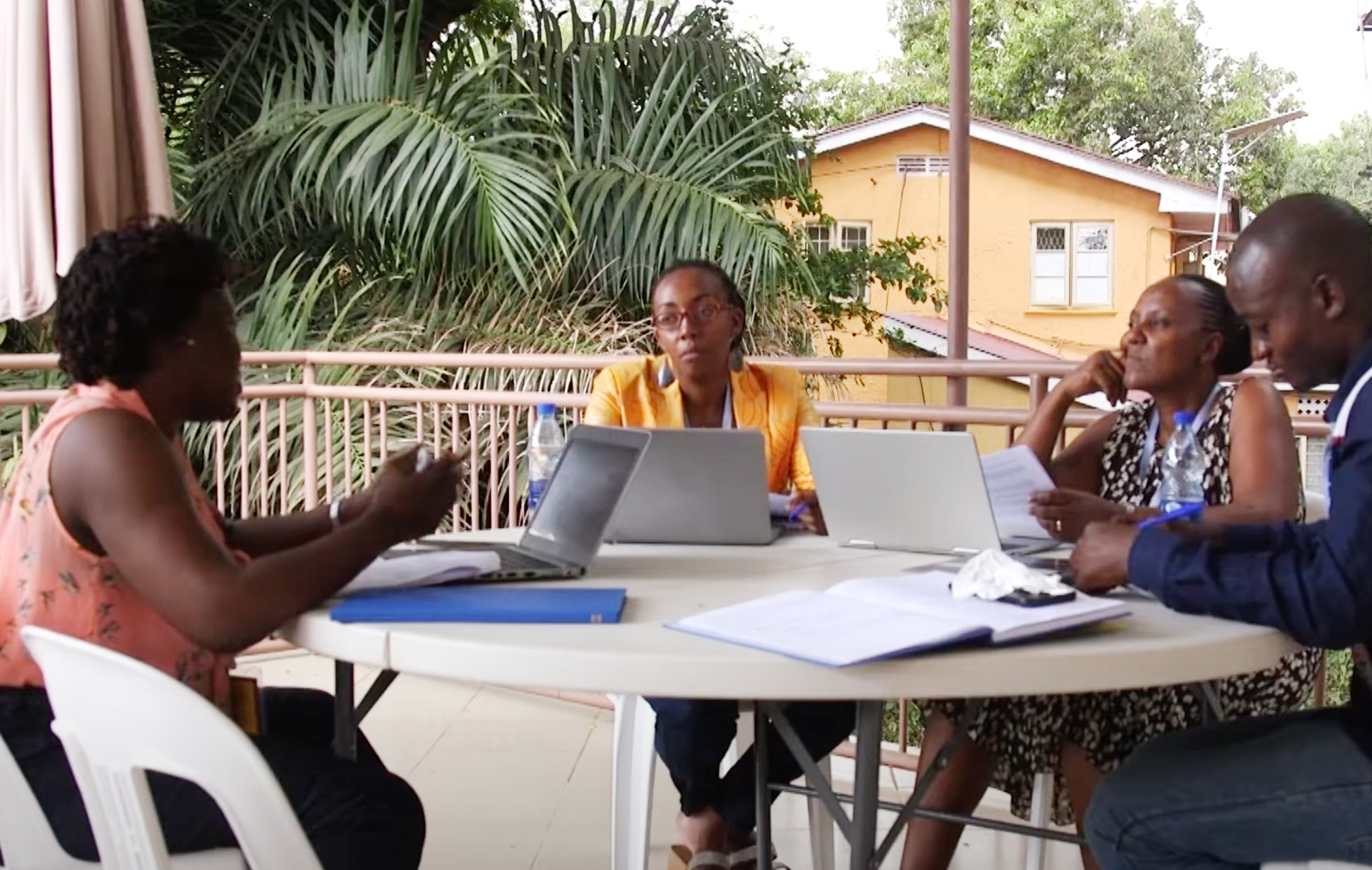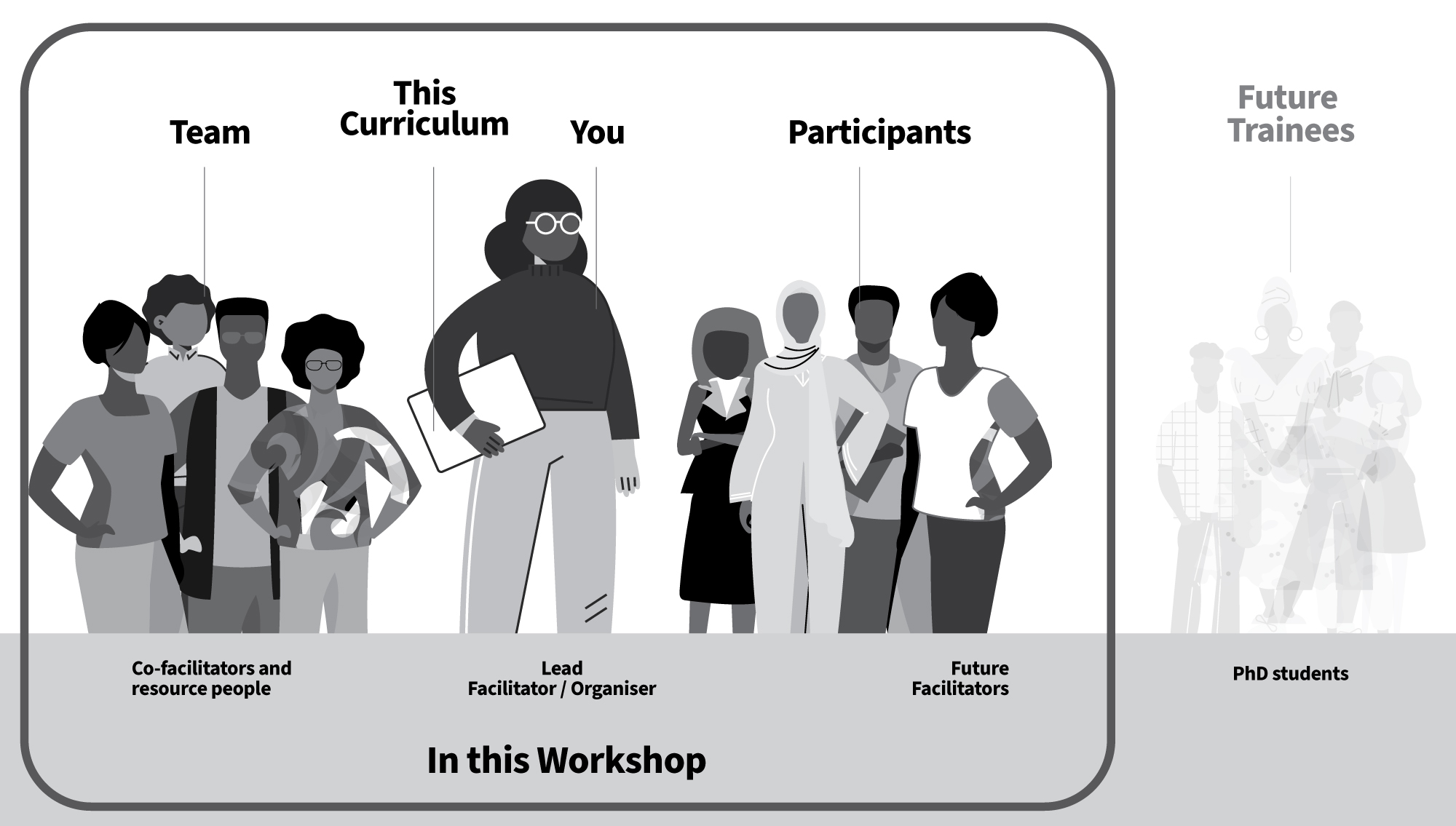PhD Training
Critical skills for research-based doctorates and careers

Introduction
For you, the facilitator or organiser of doctoral training, this curriculum offers either a comprehensive, sequenced PhD journey or a selection of sessions to create or enrich your own programme. CARTA’s approach to training is not conventional – these participatory methods promote agency, are fun to teach, and develop multi-potential 21st century researchers who can work across disciplines. Because the sessions focus more on how to teach, rather than the content of what to teach, you can use or adapt CARTA’s approach for most research-based PhD programmes.
Watch this video as preparation for using this curriculum.
Download this curriculum in full.
Overview
CARTA training is designed to enhance students’ skills and knowledge along the pathway to a PhD and to guide and propel them through the research process. As the facilitator or coordinator of PhD training in your institution, you can choose whether to:
- Adopt or adapt the four sequential phases along the PhD Journey, designed and tested by CARTA as a coherent program, or
- Search the Skills Index to identify sessions that teach specific competencies.
The PhD Journey groups training in four phases:
- Prepare Research Question and Protocol builds critical thinking, technical skills, and other core research competencies and methodologies.
- Focus on Methods introduces the concepts and software to plan, manage, and analyse both qualitative and quantitative data, as well as the idea and benefits of mixed methods research.
- Analyse Data and Write focuses on data presentation, the doctoral dissertation, and scientific writing, along with communication skills to disseminate results.
- Prepare for Post-graduate Life addresses professional development, grant writing, teaching, policy engagement and leadership.

Approach
Key to CARTA training is the idea of learning together, whether in person or in a blend of virtual and in-person. As students focus on group tasks and learn collaboratively, they develop and consolidate professional networks of researchers, peers, and mentors.
The CARTA approach is problem-posing and participatory, acknowledging the skills and experience that PhD students bring to the training. (Freire, 2020). It differs from the transfer or transmission of knowledge or facts to the passive learner, where the trainer is seen as possessing all essential information and trainees as ‘empty vessels’ needing to be filled with knowledge.
The choice of participatory method is deliberate: there is a coherence between values and the approach to sharing them. From the beginning, this curriculum recognizes all participants as thinking, creative people with the capacity for action. Each person is a contributor, bringing different perceptions based on their own experiences. This requires that you, as facilitator, make a conscious effort to use participatory methods to enable participants to grow in awareness.
Watch this video for more insight into CARTA’s approach.
Facilitation
Some people assume that facilitating a workshop will be an easy process, until they try doing it. The participatory method means that facilitators guide the workshop while appreciating that the participants are in charge. The facilitator’s responsibility is to create an enabling environment that allows participants to learn from each other, come to an understanding, and pool their collective wisdom in resolving issues.
A good facilitator works as an ally to ensure that meetings, seminars, planning sessions, and workshops deliver the intended and desired outcomes. Not all facilitators are alike. Ideally, you will be able to identify and involve facilitators who understand the goals and can work to deliver the expected outcomes of this curriculum. CARTA recommends these attributes for facilitators.
An unbiased perspective
Participants should feel comfortable that their opinions are welcomed and encouraged. An unbiased facilitator creates a neutral zone where alternative points of view can be shared and debated in a respectful manner. This is key to driving a constructive, productive discussion.
Sensitivity to individuals
To create and maintain an atmosphere of trust and respect requires the facilitator to be aware of how people are responding to the topics under discussion and to the opinions and reactions of others. Most people will not articulate their discomfort, hurt feelings, or even anger; instead, they silently withdraw from the discussion and often from the group. Sensing how people are feeling and understanding how to respond to a particular situation is a critical skill of facilitation.
Sensitivity to the group
In any group, the whole is greater than the sum of the parts, and group ‘chemistry’ generally reflects shared feelings: eagerness, restlessness, anger, boredom, enthusiasm, suspiciousness, or even silliness. Perceiving and responding to the group’s dynamic is essential to skilful facilitation.
Ability to listen
One way the facilitator learns to sense the feelings of individuals is by listening carefully, noting both the explicit meaning of words and their tone and implicit meaning. A good facilitator practices ‘active listening’. They may repeat, sum up, or respond directly to what a speaker says to ensure that the speaker’s meaning is correctly understood by the group.
Tact
Sometimes, a facilitator must say difficult things for the good of the group. The ability to do so carefully and diplomatically is critical. Examples include a group discussion dominated by one person or a group of silent participants. The facilitator must find a gentle, tactful way to engage the team so everyone can participate and get the most out of the session. Often, a participant asks a question, and then rambles on, eventually answering his own question. A capable facilitator knows how to diffuse these awkward moments and maintain a productive atmosphere.
Commitment to collaboration
Collaborative learning can occasionally seem frustrating and inefficient. At these moments, every facilitator feels tempted to take on the familiar role of the traditional teacher and to lead, rather than facilitate. However, genuine conviction about the empowering value of cooperative learning will help the facilitator resist a dominating role. Likewise, a good facilitator is willing to share facilitation with others in the group. The goal is always to conduct the best and most effective discussion. To that end, a good facilitator knows how to adjust his or her role accordingly.
A sense of timing
The facilitator needs to develop a sixth sense for timing: when to bring a discussion to a close, when to change the topic, when to cut off someone who has talked too long, when to let the discussion run over the allotted time, and when to let the silence continue a little longer.
Resourcefulness and creativity
Each group of participants presents different dynamics. Despite a well-planned agenda, discussions may not unfold as anticipated. A good facilitator should be able to think on their feet. This may mean changing direction in mid-stream, using other creative approaches to engage the group, or welcoming ideas from the group on how to shift the agenda. Good facilitators always have tricks up their sleeves that will help a group move forward while still keeping an eye on the overall objective of the meeting.
A sense of humour
As in most human endeavours, even the most serious, a sense of humour enhances the experience for everyone. A good facilitator appreciates life’s ironies and is able to laugh at themselves and share the laughter of others.
Preparation
You will find detail on preparation for each session or sequence of sessions. In general, you may need to check how participants will access references that are not open-access. Some sources may require payment, an email request to authors, institutional log in, or a portal such as Hinari.
In plenty of time, identify and engage the co-facilitators and other contributors for specific sessions. Advise facilitators to read the relevant sessions until they feel comfortable and confident with the material. Convene as a team until all members are on the same page. You may decide to run a Training of Trainers for facilitators.
The PhD Journey
Sessions grouped in four phases
Prepare Research Question and Protocol
Sessions & Sequences
Professional Development Plan – PhD
Multidisciplinarity
Gender and Health
Gender, Sexuality, and Values
Research Question and Methodology
Designing PowerPoint Slides
Health and Demographic Surveillance System
Field Visit
Academic Writing
Academic Citizenship Introduced
Research Concepts
Focus on Methods
Sessions & Sequences
Diagnostic Sessions
Research Development Clinics
Qualitative Methods
Quantitative Methods
When to Standardise and How
Academic Posters
Spiderweb: Social Determinants
Introduction to health economics
Analyse Data and Write
Analyse Data and Write
Scientific Blitz
Journal Club
Writing and Analysis Sessions
Work in Progress
Pitching Articles and Ranking Journals
Qualitative Data Analysis
Quantitative Data Analysis
Data Analysis Plan Revisited
Manuscript Club
Policy Engagement and Briefs
Prepare for Post-graduate Life
Sessions & Sequences
Grant Proposals
Teaching
Leadership
Advocacy and Influence
Skills Index
Choose a skill from the list to find the sessions that cover it
Critical Thinking
Analytical Thinking
- Research Question and Methodology
- Health and Demographic Surveillance System
- Academic Writing
- Qualitative Data Analysis
- Quantitative Data Analysis
- Diagnostic Sessions
- Academic Posters
- Field Visit
- Spiderweb: Social Determinants
- Quantitative Data Analysis
- Qualitative Data Analysiss
- Scientific Blitz
- Manuscript Club
- Work in Progress
- Grant Proposals
- Gender & Health
- Gender, Sexuality, and Values
Scientific Reading & Writing
Giving Feedback
Knowledge Translation
Research Leadership
Academic Citizenship
Social Justice
Multidisciplinarity
Technical Depth
Scientific Communication
Project Management
Ethics
Training of Trainers
To implement this curriculum effectively, facilitators must be well prepared. This ToT workshop builds or refreshes the skills and background knowledge of your team.
Download the ToT workshop.
